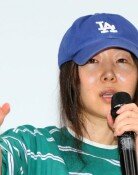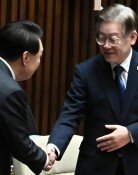Life of monk writing nirvana poem
Life of monk writing nirvana poem
Posted September. 29, 2016 07:04,
Updated September. 29, 2016 07:21
“Upon hearing that I would become a cow without nostrils, I suddenly realized that the whole world is my home.” This is Odosong through which Buddhist monk Rev. Gyeongeo (1849-1912) described the ecstasy of enlightenment. He is the monk who revitalized the Zen Buddhism in Korea. The song does not contain any difficult words but sounds difficult to understand nonetheless: this is because the lines have implicit expressions of philosophical thinking that goes beyond logic and common sense, just like Zen riddle that sounds neither too easy nor too difficult.
In Buddhism, there is a tradition of Imjongge, which monks leave behind when they pass away, along with Odosong that they recite when achieving spiritual enlightenment. A monk jots down in person or his or her disciple dictates the monk to create Imjongge, which is also known as Yeolbansong (nirvana poem). Imjongge that Rev. Seongcheol wrote right before passing away in 1993 became a hot topic of conversation in the Korean society at the time. "Cheating groups of men and women throughout the life; sins and karmas that fill the space are passing through Mt. Sumi, as one is dumped alive to the hell and hence the sense of resentment is overflowing. As a result, it is hanging on the green mountain, while emitting a bundle of round wagon wheels."
Rev. Wolju (81), the chief monk at Geumsan Temple in Gimje in North Jeolla Province, recently criticized excessive promotion of Odosong and Imjongge. Believing that if a disciplinant has concentrated on disciplining throughout the life, the life in itself is great and honorable, he criticized the reality in which monks who have not sufficiently train and discipline themselves write Odosong, or disciples of a deceased monk who passed away without leaving Imjongge behind create Imjongge randomly on their own. “When Rev. Cheongdam passed away in the 1970s, people around him suggested creation of Imjongge. But they did not, because there was no need for an Imjongge given that the way Rev. Cheongdam lived is Imjongge in itself.” Rev. Wolju said. “We should not create half-baked Odosong and Imjongge. My Imjongge is also the way I lived." The monk is apparently trying to block people from excessively exaggerating and glorifying a disciplinant.
I had a chance to have conversation in the same context with Rev. Beopjeong. “One monk scolded disciples who asked the monk ‘to leave behind Imjongge,’ and said ‘what I have said thus far is (my) Imjongge in itself. What is important is not what kind of messages one leaves, but what kind of life he or she has lived," he also said. "Imjongge that I will leave behind in the final days of my life is the sound of the bamboo gate of enlightenment called ‘The life that I have lived myself.’ A weighty topic of discussions is lying in it. “What kind of Imjongge are you currently writing?”
고미석기자 mskoh119@donga.com
Headline News
- Med professors announce intention to leave hospitals starting Thursday
- Bridge honoring Sgt. Moon Jae-sik unveiled in Pennsylvania
- Chief of Staff Chung tells presidential secretaries to stay away from politics
- US FTC bans noncompete agreements
- N. Korea launches cyberattacks on S. Korea's defense companies







